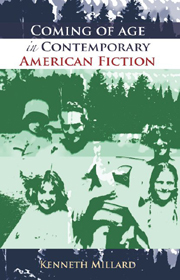Book contents
- Frontmatter
- Contents
- Acknowledgements
- Introduction: Contemporary Coming of Age – Subject to Change
- 1 In the Name of the Father
- 2 I Change Therefore I Am: Growing up in the Sixties
- 3 Citation and Resuscitation
- 4 Language Acquisition: Life Sentences
- 5 Lexicon of Love
- 6 Memoirs and Memorials
- Conclusion
- Bibliography
- Index
1 - In the Name of the Father
Published online by Cambridge University Press: 12 September 2012
- Frontmatter
- Contents
- Acknowledgements
- Introduction: Contemporary Coming of Age – Subject to Change
- 1 In the Name of the Father
- 2 I Change Therefore I Am: Growing up in the Sixties
- 3 Citation and Resuscitation
- 4 Language Acquisition: Life Sentences
- 5 Lexicon of Love
- 6 Memoirs and Memorials
- Conclusion
- Bibliography
- Index
Summary
An important issue in the coming-of-age novel is the way in which finding a place in society is coterminous with finding a satisfactory relationship with the father. For the young male protagonist especially, the relation to the father is a vital means to socialisation, and he is often the principal figure through whom the codes of society are learned. Coming of age is thus a drama of coming to terms with the father, and with all the social and cultural governance for which he stands. With the frequency of divorce in contemporary American society this relation to the father is often problematised: how does the protagonist come to terms with a father who is absent, and what are the social implications of this challenge? In the novels explored in this chapter the father went missing before the narrative began. The search for the father is complicated in various ways, and therefore both novels are characterised not only by absent fathers, but also by various father-surrogates who are important potential role models. In this way, the efficacy of fathers is scrutinised, while simultaneously the desire for a relationship with the father dictates the shape of the protagonist's journey.
The father, of course, is also The Father, and in both of these novels the search for a literal or corporeal father is to some extent analogous to a search for a fulfilling spiritual belief.
- Type
- Chapter
- Information
- Coming of Age in Contemporary American Fiction , pp. 15 - 45Publisher: Edinburgh University PressPrint publication year: 2007



